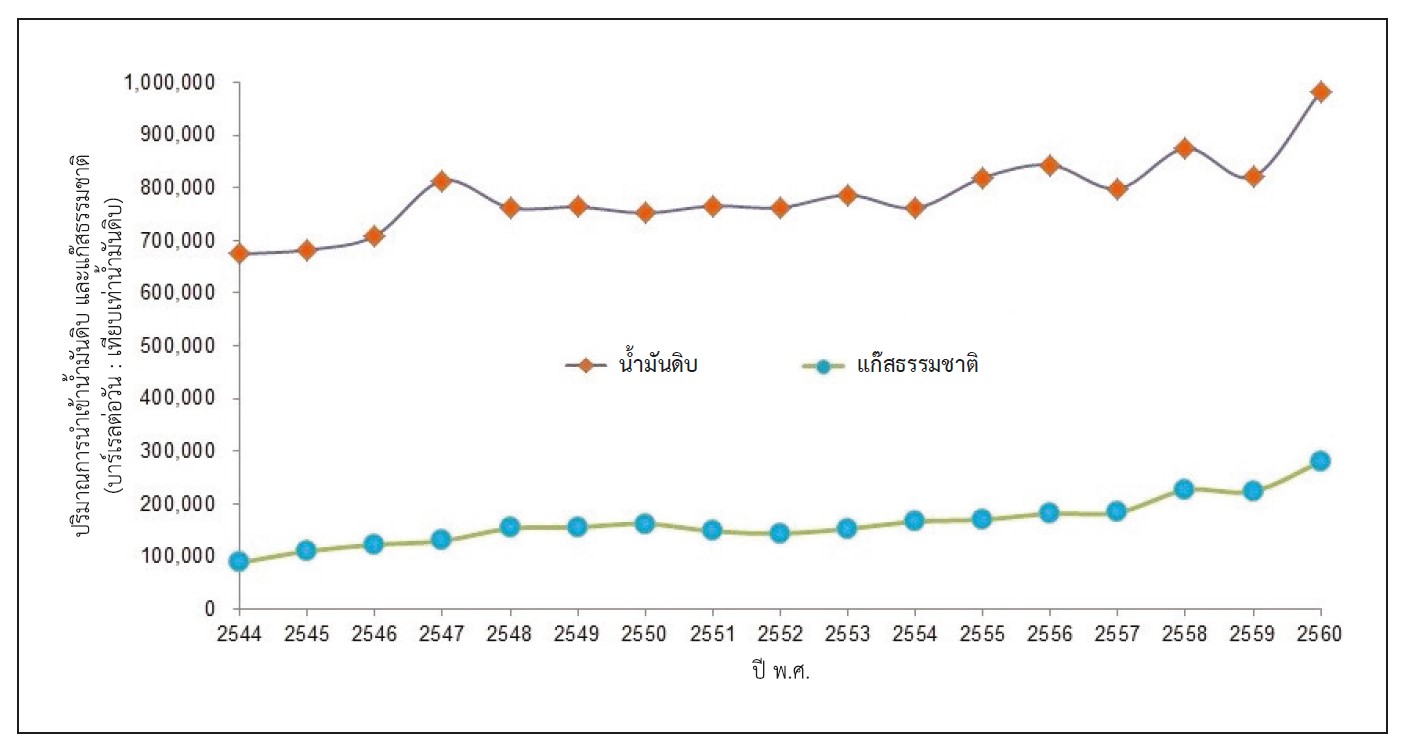Influence of Gasohol Consumption in Transportation Sector on the Increasing of Sugarcane and Cassava Production in Thailand
Keywords:
Sugarcane, Cassava, Ethanol, GasoholAbstract
This research report investigates the influence of gasohol consumption on the increasing of sugarcane and cassava production in Thailand. Currently, there are three types of gasohol being produced for consumption within Thailand: gasohol E10, E20 and E85. The most popular raw materials used in ethanol production in Thailand are molasses and cassava. In the past, the government has taken measures to encourage car users to use gasohol more to reduce the import of energy from abroad, especially energy in the form of crude oil. In this research, the data of import of crude oil, gasohol consumption, other fuels consumption, ethanol production, sugarcane production and cassava production were investigated by researcher. The data of gasohol consumption and ethanol production capacity were annually collected and analyzed and found that there is a high demand for ethanol for the production of gasohol each year. In the years 2009 - 2017, the amount of ethanol which was used for gasohol production, increased at a very high rate. It will increase with the trend towards ethanol production (use of sugarcane and cassava as raw material) in 2023. And afterwards, ethanol production capacity is insufficient to meet market demand.
References
Bangchak Petroleum Public Company Limited 2016. Annual Report 2016. Retrieved May 5, 2017 from http://www.bangchak.co.th.
Bilister G. 2006. Ethanol production from Sugarcane in Brazil. Pastellrepro AB. Stockholm.
James J. 2007. Ethanol from sugar: what are the prospects for U.S. sugar co-ops?. High Beam Research, Inc.
Department of Agriculture. 2016. Energy use in agriculture. Retrieved June 15, 2017 from http://www.doa.go.th.
Department of Foreign Trade. 2016. Renewable energy from waste materials. Retrieved June 9, 2017 from http://www.dft.moc.go.th.
Department of Natural Fuels. 2016. Annual Report 2016. Retrieved June 11, 2017 from http://www.dmf.go.th.
Gonsalves J. B. 2006/7. An Assessment of the Biofuels Industry in Thailand. United Nations Conference on Trade and Development, UNCTAD/DITC/TED.
Institute of Energy for Industry. 2016. Ethanol. Retrieved May 17, 2017 from http://www.iie.or.th.
Ministry of Energy. 2016. Government Energy Policy. Retrieved June 2, 2017 from http://energy.go.th.
M. Regis Lima Verde Leal. 2007. The Evolution of the Brazilian Ethanol Industry. London.
National Research Council of Thailand. 1993. Annual Report 1993. Retrieved May 6, 2017 from https://www.nstda.or.th/th/nstda-annual-report/442-annual-report-1993.
Office of Industrial Economics. 2016. Industry Overview. Retrieved May 6, 2017 from http://www.oie.go.th.
Office of Sugarcane and Sugar Board. 2016. Domestic sugarcane and sugar situation. Retrieved May 5, 2017 from http://www.ocsb.go.th.
Policy of the Cabinet, General Prayuth Chan-O-cha Government. 2014. Policy Statement of the Cabinet. Retrieved May 24, 2017 from http://www.mfa.go.th/mofa/contents/files/ plan-20141016-112823-765038.pdf.
PTT Public Company Limited 2016. Annual Report 2016. Retrieved May 5, 2017 from http://www.pttplc.com.
Rodrigues D. and Ortiz L. 2007. Case study sugarcane ethanol from Brazil. Sustainability of ethanol from Brazil in the context of demanded biofuels imports by The Netherlands.
Saka S. 2005. The Asian Ethanol Market. 2005 International Ethanol Conference. Ethanol – the Smart Way Forward. Brisbane Convention and Exhibition Center. Queensland. Australia.
Vasconcelos J. N., Lopes C. E. and Franca F. P. 2004. CONTINUOUS ETHANOL PRODUCTION USING YEAST IMMOBILIZED ON SUGAR-CANE STALKS. Brazilian Journal of Chemical Engineering. Vol. 21. No. 03. pp. 357 - 365. https://doi.org/10.1590/S0104-66322004000300002

Downloads
Published
How to Cite
Issue
Section
License
Copyright (c) 2019 https://creativecommons.org/licenses/by-nc-nd/4.0/

This work is licensed under a Creative Commons Attribution-NonCommercial-NoDerivatives 4.0 International License.



